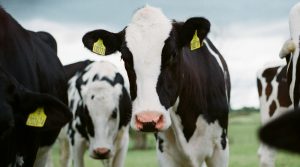
Key points:
- Norco increases payments to farmers by 12c/L
- Suppliers will get 83-85c/L which is a record for the cooperative
- Dairy group worried about rising costs and critical of other companies
It comes at a time when the both the processor and its milk suppliers are struggling after the catastrophic floods hit the Northern Rivers and south-east Queensland three months ago.
Vice-president of eastAUSmilk and Norco supplier Graham Forbes said it was a great decision from the cooperative.
“It’s going to take milk prices to between 83 to 85 cents per litre,” he said.
Norco is facing its own challenges at the moment, with its ice-cream factory, head office and rural store in South Lismore sustaining damage during the February 28 flood event.
At least half of Norco’s 200 farms in northern New South Wales and Queensland were also affected, with livestock lost and fences, pastures, machinery, homes and dairies destroyed.
At least 200,000 litres of milk was dumped because tankers could not access farms to collect it.
Mr Forbes said it has been a “horrendous” time for farmers, and it has been made worse by the rising cost of production generally.
“Fertiliser is up 250 per cent, fuel’s up 100 per cent, everything’s up 25 to 30 per cent,” he said.
He was also critical of other milk processing companies.
“Some of the other processors have come out with a meagre price rise and others haven’t even made a price rise yet,” he said.
Prices up, but not enough
Milk processor Lactalis has announced a nine cents a litre rise for the northern milk market and a bonus for new milk, which Mr Forbes supported, but he said he was disappointed by the five cents a litre increase announced by Bega Cheese.
He thinks it is especially disappointing given Andrew “Twiggy” Forrest recently bought a 9 per cent share in Bega.
“It’s really disappointing when you see one of the richest people in Australia investing into Bega … and for Bega to come out that low,” he said.
“I don’t know what their methodology is, but I hope that people like Twiggy Forrest have a better corporate appreciation for the farmers that supply the milk.”
The Canadian company Saputo has not yet announced its price for its northern suppliers.
Under the new industry code of practice, dairy processors are required to publish their minimum milk price by June 1 each year.
Coles follows suit
Supermarket chain Coles has increased its price, even though their suppliers are locked into a three-year fixed milk price contract.
Supplier Dave Jones from the Derwent Valley in Tasmania said he appreciated the move.
“They don’t have to do anything, but they have, which is really lovely,” he said.
Three dairy farmers supply all the fresh milk needed for Coles Supermarkets in the state, and Mr Jones said the price increase was a welcome relief from high input costs.
Neither Coles or their suppliers have said how much they would be getting but Mr Jones said it was high.
“It’s above what the other guys are offering,” he said.
But more was needed according to Mr Forbes.
He said he wanted the new federal government to look at ways to make the industry sustainable to stop the exodus of dairy farmers.
“We won’t have an industry in Queensland in 10 years’ time,” he said.
“We all have to make a profit out of milk and if that doesn’t happen our industry won’t continue to exist.”
























